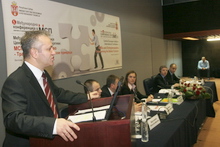- Serbia
Get to know Serbia
- Citizens
Culture and science
Health services
Pension and disability insurance
- Business
Employment
Economy
- Media
- Government
- Contact
Keep in touch
Contact form
Back
Keepin touch
Whether you have a question, comment, suggestion or any problem in the purview of the government, send us your message and we will try to respond as soon as possible. If your problem is not in our purview, we will forward your message to the relevant institution.
Q:
A:
Fifth international conference on SMEs opens
Belgrade,
23 November 2007
Serbian Minister of Economy and Regional Development Mladjan Dinkic opened today at the Sava Centre the 5th international conference on small and medium-sized enterprises (SMEs) themed “SMEs and Entrepreneurship – Transformation of the Balkan Economy”.
Dinkic stressed that economies of the Balkan countries are developing thanks to the shift to market economy and benefits of the EU integration process.
He said that countries in the region must cooperate better, particularly in the SME sector, which holds a considerable potential for progress, and added that SMEs in Serbia create 60,000 new jobs every year.
The Ministry of Economy and Regional Development has devoted this annual conference on SMEs to challenges and opportunities which governments in the Balkans are faced with, and it aims to provide further stimulus to SME development with greater international cooperation.
Two aspects are most important, namely, better cooperation based on the already achieved progress and the removal of the remaining barriers regarding international trade and investments, which will lead to a reduction in economic expenses.
The conference will gather representatives of the European Commission and Balkan countries who will focus on practical ways for improving cooperation in the interest of SMEs in the region.
Topics to be discussed include support to entrepreneurship in the Balkans, access to capital, improvement of inter-state cooperation, foreign direct investments, pre-contractual possibilities for SMEs, cooperation on innovations and research and improvement of the quality guarantee system.
Assistant Minister for SMEs Igor Brkanovic said that all countries in the region need good SME development strategies and their implementation.
Brkanovic pointed to the European Charter on Small Enterprises as an example of cooperation between the European Commission and Western Balkan countries which resulted in an improved environment for SMEs.
The Central European Initiative is the main sponsor of the conference, organised by the Ministry of Economy and Regional Development, with the support of the Norway’s Entrance programme and the International Labour Organisation.
He said that countries in the region must cooperate better, particularly in the SME sector, which holds a considerable potential for progress, and added that SMEs in Serbia create 60,000 new jobs every year.
The Ministry of Economy and Regional Development has devoted this annual conference on SMEs to challenges and opportunities which governments in the Balkans are faced with, and it aims to provide further stimulus to SME development with greater international cooperation.
Two aspects are most important, namely, better cooperation based on the already achieved progress and the removal of the remaining barriers regarding international trade and investments, which will lead to a reduction in economic expenses.
The conference will gather representatives of the European Commission and Balkan countries who will focus on practical ways for improving cooperation in the interest of SMEs in the region.
Topics to be discussed include support to entrepreneurship in the Balkans, access to capital, improvement of inter-state cooperation, foreign direct investments, pre-contractual possibilities for SMEs, cooperation on innovations and research and improvement of the quality guarantee system.
Assistant Minister for SMEs Igor Brkanovic said that all countries in the region need good SME development strategies and their implementation.
Brkanovic pointed to the European Charter on Small Enterprises as an example of cooperation between the European Commission and Western Balkan countries which resulted in an improved environment for SMEs.
The Central European Initiative is the main sponsor of the conference, organised by the Ministry of Economy and Regional Development, with the support of the Norway’s Entrance programme and the International Labour Organisation.
-
 Belgrade, 7 November 2025
Belgrade, 7 November 2025Gratitude to Italy for continuous support for Serbia’s European path
-
 Belgrade/Doha, 4 November 2025
Belgrade/Doha, 4 November 2025Serbia among signatories of new declaration on social development in Doha
-
 Belgrade, 3 November 2025
Belgrade, 3 November 2025Assessments of Serbia’s reform efforts should be based on realistic indicators
-
 Belgrade, 28 October 2025
Belgrade, 28 October 2025Improving comprehensive cooperation between Serbia, Ireland
-
 Belgrade, 28 October 2025
Belgrade, 28 October 2025Rotation of Serbian Armed Forces medical team in mission in Central African Republic
-
 Belgrade, 22 October 2025
Belgrade, 22 October 2025Police working intensively to clarify incident outside parliament
-
 Belgrade, 8 October 2025
Belgrade, 8 October 2025Strong protest over continued arming of Priština, violation of UN Security Council Resolution 1244
-
 Topola, 7 October 2025
Topola, 7 October 2025Diplomatic corps visits Topola, Oplenac
-
 Belgrade, 6 October 2025
Belgrade, 6 October 2025Continuation of intensive cooperation with Russia in all areas of mutual interest
-
 Belgrade, 6 October 2025
Belgrade, 6 October 2025Boat carrying several Chinese citizens capsizes on Danube

